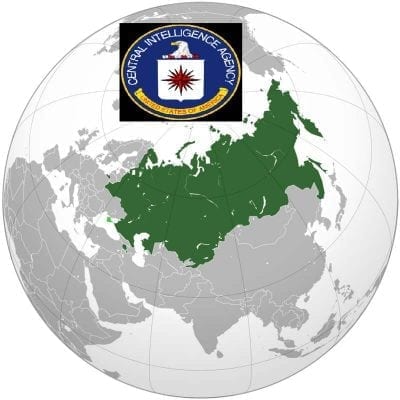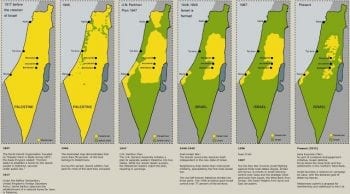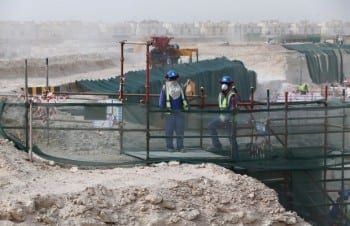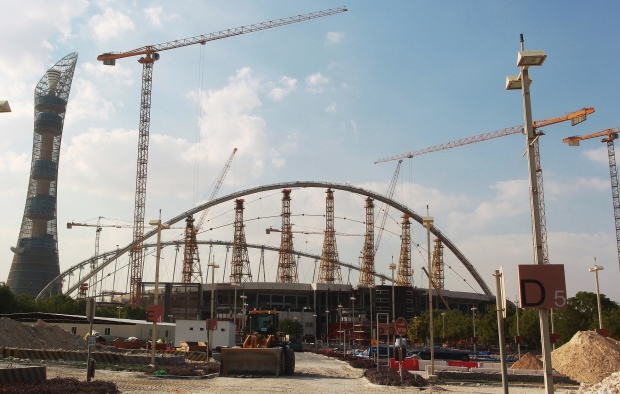//
 WITNESS TO HISTORY
WITNESS TO HISTORY
CALEB MAUPIN

[dropcap]P[/dropcap]residential Candidate Donald Trump is known for being very crass and rude. However, he also has a way of openly stating what other billionaires are thinking, but are afraid to say out loud.
In one of his earliest interviews, Trump stated a concern that is probably on the mind of many foreign policy analysts. He said: “You can’t have everybody hating you. The whole world hates us. One of the things that I heard for years and years, never drive Russia and China together, and Obama has done that.”
It’s not only Donald Trump who has this concern. The Council on Foreign Relations, a Wall Street think tank that can otherwise be described as the CIA’s brain, has become obsessed with the issue. The latest issues of the CFR’s publication, Foreign Affairs, speak of the China-Russia alliance at length.
Why Does Wall Street Hate Russia and China?
The Eurasian bloc and its allies have scored key economic victories against the United States and Western Europe on the global market. State-controlled industries in Mainland China, which was considered the impoverished, semi-feudal “sick man of Asia” just 70 years ago, now produces half of all the steel and aluminum on Earth. Russia’s oil and natural gas resources are being sold across Europe, and the Islamic Republic of Iran is starting to move into these markets as well.
Editor’s Note: It should be noted that the U.S. deliberately divested itself of its industrial and manufacturing capacity via first outsourcing (starting as early as the late 1960s), and then formal mechanism of GATT and NAFTA. The argument being that the US. would gain and expand higher paying technical jobs (not); the real reason being profit margins for large corporations. This killed many communities. There was some intimation that the US would remain the premiere and unchallenged financial house, but globalization has challenged that as well.
Questions were raised as early as the 1980s as to whether a society that produced nothing could survive. Yet the pressure for ever increasing profits created the US as the first “post-industrial” society. It is in this context that the conflicts of the twenty-first century are occuring for there is still no corporate draw to tie themselves to national interests or controls and a battle occurs on multiple levels across the planet leaving death and destruction in its wake. However, even the process of destruction has been structured to profit the global .1%.
The global economic set-up has long functioned like the Roman Empire, where “all roads lead to Rome,” or in this case, to Wall Street and London. But as Eurasia raises its head, bringing South America and parts of the Middle East along with it, the world no longer has to buy its steel, aluminum, and oil from Western corporations. Markets are slipping out of Western fingers. Developing countries no longer have to take out loans from the World Bank and the International Monetary Fund. The “New Silk Road” vision from China, the stabilization of Russia and the Islamic Revolution of Iran, and the Bolivarian movement of Latin America, have all created something western capitalists have never tolerated: competitors.
It is maintenance of monopoly on the global market, not some phony concern about “human rights” or “expansionism” that drives the rising hostility against Russia, China, and any country that dares align with them. Regimes that function as obedient Western clients violate human rights and engage in aggression all the time.
The oil vassals of Kuwait, Qatar, United Arab Emirates and Saudi Arabia make no pretense honoring human rights.
The leaders of South Korea’s only real electoral opposition, the Unified Progressive Party, all sit in prison simply because of a hypothetical conversation that was audio recorded.
The number of human rights activists and dissidents who have been killed, tortured, or disappeared in US-aligned Latin American countries like Colombia, Guatemala, and Honduras is incalculable. The US backed the autocratic PRI regime in Mexico for many years and is currently supporting the corrupt, drug-infested Narco regime that now runs the country.
The US-aligned Turkish state, which has an ugly history of atrocities against the Kurds, is now rounding up college professors and anyone else who dares question or “insult” President Erdogan.
The US-backed regime in Ukraine has a Nazi division of its armed forces called the Azvo Battalion. Not only does the US openly align with the anti-Russian, Hitler glorifying fanatics in Kiev as they wage brutal war against their Eastern compatriots, but US military personnel actually provides them with training..The concept of “human rights” has been completely politicized by well-funded foundations that promote the geopolitical goals of Wall Street. Voices in US media raise their “concerns” about human rights almost exclusively against countries that dare assert their economic independence or align with Russia and China.
Many leftists and progressive people in Western countries are easily duped by “human rights” propaganda. They often believe they can gain credibility for their critique of Western society by joining in the demonization of the Pentagon’s latest target.
Like the Southern plantation owners who claimed they were “civilizing” and “bringing Christianity” to those they enslaved, the NATO military machine and its Wall Street paymasters always claim they are overthrowing governments because they have a big heart, and are flowing with compassion for those who are suffering. As the attacks on Libya, Iraq, Afghanistan, and now Syria have shown, the “innocent victims”, who become the focus of propaganda campaigns promoting “humanitarian intervention,” usually end up in far-worse circumstances than before.
The Basis of the Eurasian Alliance
The division of the Soviet Union and the People’s Republic of China was a key factor in the outcome of the Cold War. In 1961, the Chinese Communist Party and the Communist Party of the Soviet Union had incompatible foreign policy strategies. Mao Zedong’s China had become a symbolic epicenter of anti-colonial struggles in the Third World. Khruschev’s Soviet government was desperately trying to engage in diplomacy in the hopes of preventing atomic war. The Soviet Union cut its ties with the People’s Republic of China in 1961, as China denounced Soviet leaders as “revisionists” and “betrayers” of the cause of global revolution.
The division between the two great powers escalated over the course of the following decade. Border disputes erupted. By the early 1970s, the final years of Mao Zedong’s life, the most populous country on earth was no longer telling its allies to oppose Western capitalism, but rather that “Soviet Social Imperialism” was the “main danger” to humanity.
This shift weakened anti-capitalist and anti-imperialist forces significantly. The Chinese invasion of Vietnam, the civil war between leftist factions in oil rich Angola, the re-alignment of Poland, Romania, Albania, and various other European Marxist governments, were all decisive in the eventual defeat of the Soviet Union.
However, since the end of the Cold War, the geopolitical relationship that was broken apart in 1961 with the “Sino-Soviet Split” has gradually re-emerged. As the Russian Federation became more stable and economically prosperous after the disasters of the 1990s, it grew closer to the People’s Republic of China. The two countries, one led by a Communist Party and the other now led by nationalist forces, have formed an economic and political alliance that is once again challenging the monopoly of Western capitalism.
In Russia, the economy is centered on the export of publicly owned oil and natural gas resources. In China, the state controls banking and most major industries. Both Russia and China long ago abandoned the kind of “really existing socialism” pioneered by Stalin with his “Five Year Plans.” However, neither Russia nor China can truly be described as capitalist. In both countries, the decisions of state central planners, not the anarchy of production, dictate the majority of economic activity. The two countries have many billionaires, yet both governments are not afraid to punish capitalists who stray from the state’s overall economic vision. There is plenty of capitalism in China and Russia, but it is a submissive capitalism, functioning under the boot of much more powerful state economic sector.
The Russian and Chinese states are not like the corporatocracies of the West. Their strength comes from highly organized and deeply politicized populations, both committed to a collective nationalist vision. Western liberalism with its glorification of profits and individualism is collapsing in the face of a collectivist alternative. Over the course of the 20th century, the Eurasian societies learned to restrain and control market forces. This has made them stronger than many Western analysts can even imagine.
The Eurasian Bloc now lays the basis for the primary alternative to Western capitalism on the global stage. Brazil and the Islamic Republic of Iran have economies and states that function in almost the same way as Russia and China. The Bolivarian movement in Latin America has unleashed a more traditionally leftist and Marxist version of this economic model, and both Cuba and the Democratic People’s Republic of Korea are gradually shifting in this direction.
Strategy for Attack: Oil Price Manipulation and Takfirism
Speaking for the Council on Foreign Relations, Robert Kaplan gleefully predicts “Coming Anarchy” in Eurasia. The article goes on to lament the Chinese slowdown and describe how low oil prices have hurt the Russian state.
“
Takfiri” is a derogatory term for Muslims who kill other Muslims over religious differences. It is used by Shia revolutionaries to describe wahhabi jihadists who want to slaughter them.
The drop in oil prices is no accident. The Kingdom of Saudi Arabia, which sells oil almost exclusively to Wall Street and buys weapons almost exclusively from the Pentagon, has engaged in what looks like an episode of self-mutiliation, dropping prices by exporting huge amounts of oil. Saudi Arabia’s economy is in a state of ruin, as the country takes out more loans in order to expand its oil apparatus.
Negotiations among oil exporting countries continue to fail and the price has not recovered from the dramatic decreases of 2014. This is no accident. Saudi Arabia is intentionally dropping the prices as a part of geopolitical strategy developed by its overlords in Washington DC. The hope is to wreck the economies of Russia, Venezuela, and Iran, all of which are centered around the export of publicly owned oil resources.
Interestingly, a recently published article, also from the Council on Foreign Relations, touts “the use of economic instruments to accomplish geopolitical objectives” as an “American Tradition.”
The oil price drop has created political problems, not just in Russia, but primarily among its allies in South America. The United Socialist Party suffered its first significant electoral defeat in recent history with the US-funded opposition winning at the polls in December. In Brazil, a political crisis has unfolded surrounding the fiscal problems of Petrobas, the state-owned oil company. The once popular, left-wing President Dilma Rousseff, who is very friendly to Russia and China, now faces impeachment.
The economic attack in the form of low oil prices is being followed up by another gem from the CIA’s toolbox, Wahabbism. Religious extremism of the variety found in Saudi Arabia is getting stronger in the Middle East. Violent extremists such as ISIS and the Al-Nusra front are very powerful in sections of Syria and Iraq. CIA training camps in Jordan, the open Turkish-Syrian borders, and the continued flow of weapons into Syria from US-aligned Gulf States, have made the “Jihadist” current stronger than ever.
The CIA has been friendly with Takfiri extremists for a long time. Osama Bin Laden comes from a wealthy Saudi family with a near monopoly construction within the Kingdom. His career as an extremist began in Afghanistan, where he cooperated with the USA and NATO to fight against the People’s Democratic Party and the Soviet Union during the 1980s. The Muslim Brotherhood cooperated with the CIA to work against Arab Nationalist Abdul Nasser in Egypt. US links with the Takfiri “Jundallah” organization that bombs innocent people in Iran were exposed by the New York Times.
The scourge of Takfirism now threatens China as a wave of stabbings and other terrorist attacks have been unleashed. Chinese Uyghurs, a historically Muslim minority within the People’s Republic, have been fighting in Syria against the government alongside Wahabbi terrorists and extremists. China is openly concerned about what could happen when these forces return home. The Council on Foreign Relations, an entity that works closely with the CIA, now openly predicts the rise of anti-Chinese and anti-Russian religious extremism in Kyrgyzstan, Kazakhstan, Tajikistan, Turkmenistan, and Uzbekistan.
The strategy employed by the Obama administration to attack the Eurasian Bloc is two-fold. First, create a economic problems by dropping oil prices. Secondly, unleash religious extremists to foment chaos and warfare.
Unlike Bush’s direct military attacks on Afghanistan and Iraq, which resulted in high oil prices and widespread contempt for the United States – even among NATO allies – the Obama-CIA strategy is a long-term plan. It is similar to Brzezinski’s strategies during the “détente” of the Carter administration. It is much better for the United States in terms of public relations, and it is much less risky. But the CIA strategy of economic warfare and the use of proxies to attack Eurasia has a key weakness: it’s not very profitable.
Pragmatic Strategy vs. Market Demand
Oil companies are losing money as prices stay low. Furthermore, military spending has become an essential part of the US economy since the end of the Second World War. The stock market is already starting to feel the pain. If the US economy is to continue functioning as usual, oil prices cannot remain low and military adventurism around the world cannot remain off the table.
While it is seems contrary to basic human decency, the economy of the USA needs high prices at the pump and mass slaughter around the world in order to keep functioning. Drone strikes and the militarization of domestic US police departments are not enough. Eventually, the market forces will demand that oil prices and military spending increase.
However, with the Eurasian bloc stronger than ever, the consequences of direct military attack will be much higher than before.
As is reluctantly pointed out by their greatest enemies, Russia and China have not become weaker in the last decade. They have withstood a campaign of economic sabotage and proxy wars against their closest allies. China faces a huge US military build-up all around it with the so-called “Asian pivot” of the US military. Russia has seen its Syrian allies endure half a decade of civil war, as well as the NATO’s enshrinement of the Ultra-Nationalist, Russia hating Kiev regime, right on its border. Despite persistent hostility and provocations, Russia and China continue to get stronger. Xi Jinxing and Vladimir Putin have become more popular, and the political models they have developed are inspiring a wave of independence and anti-liberalism around the world.
Wall Street is determined to break apart the Eurasian bloc, but this is a task that appears to be almost impossible.
With a US presidential election in the near future, the next few months could render some key surprises. The election of Barack Obama was directly precluded by a financial crash. George W. Bush’s presidency was permanently written into the history books by the Sept. 11th attacks, less than year into his administration.
The rise of the Eurasian bloc, made possible by the Marxist-Leninist social revolutions of the 20th century, along with the computer technological revolution which drastically changed global methods of productions, have forced a dramatic shift on the global stage. The world simply cannot function in the old way any longer. The outdated methods of colonizers and profiteers are being terminated. Profits simply cannot stay in absolute command, and a firm hand from society must force economies to function in a rational way.
History rarely unfolds like a fairy tale. The march of social progress can sometimes be slow and dull, while at other times dramatic and terrifying, but it never stops. Human civilization is now enduring a harsh period of radical adjustment, and everyone should be bracing for the ground to shake.
1 “Takfiri” is a derogatory term for Muslims who kill other Muslims over religious differences. It is used by Shia revolutionaries to describe wahhabi jihadists who want to slaughter them.

Caleb Maupin

Is an American journalist and political analyst. Tasnim News Agency described him as "a native of Ohio who has campaigned against war and the U.S. financial system." His political activism began while attending Baldwin-Wallace College in Ohio. In 2010, he video recorded a confrontation between Collinwood High School students who walked out to protest teacher layoffs and the police. His video footage resulted in one of the students being acquitted in juvenile court. He was a figure within the Occupy Wall Street protests in New York City. Maupin writes on American foreign policy and other social issues. Maupin is featured as a
Distinguished Collaborator with The Greanville Post. READ MORE
ABOUT CALEB MAUPIN HERE.
Cross-posted with New Eastern Outlook.
Note to Commenters
Due to severe hacking attacks in the recent past that brought our site down for up to 11 days with considerable loss of circulation, we exercise extreme caution in the comments we publish, as the comment box has been one of the main arteries to inject malicious code. Because of that comments may not appear immediately, but rest assured that if you are a legitimate commenter your opinion will be published within 24 hours. If your comment fails to appear, and you wish to reach us directly, send us a mail at: editor@greanvillepost.com
We apologize for this inconvenience.


Nauseated by the
vile corporate media?
Had enough of their lies, escapism,
omissions and relentless manipulation?
GET EVEN.
Send a donation to
The Greanville Post–or
SHARE OUR ARTICLES WIDELY!
But be sure to support YOUR media.
If you don’t, who will?
ALL CAPTIONS AND PULL-QUOTES BY THE EDITORS, NOT THE AUTHORS.


=SUBSCRIBE TODAY! NOTHING TO LOSE, EVERYTHING TO GAIN.=
free • safe • invaluable
If you appreciate our articles, do the right thing and let us know by subscribing. It’s free and it implies no obligation to you—ever. We just want to have a way to reach our most loyal readers on important occasions when their input is necessary. In return you get our email newsletter compiling the best of The Greanville Post several times a week.
[email-subscribers namefield=”YES” desc=”” group=”Public”]

 Nauseated by the
Nauseated by the


 Has been writing about the Middle East for over 20 years. He is an internationally-syndicated columnist, a media consultant, an author of several books and the founder of PalestineChronicle.com. His books include ‘Searching Jenin’, ‘The Second Palestinian Intifada’ and his latest ‘My Father Was a Freedom Fighter: Gaza’s Untold Story’. His website is:
Has been writing about the Middle East for over 20 years. He is an internationally-syndicated columnist, a media consultant, an author of several books and the founder of PalestineChronicle.com. His books include ‘Searching Jenin’, ‘The Second Palestinian Intifada’ and his latest ‘My Father Was a Freedom Fighter: Gaza’s Untold Story’. His website is: 
 The Khalifa stadium is one of Qatar’s flagship 2022 projects (AFP)
The Khalifa stadium is one of Qatar’s flagship 2022 projects (AFP) 


 Philosopher, novelist, filmmaker and investigative journalist. He covered wars and conflicts in dozens of countries. His latest books are: “Exposing Lies Of The Empire” and “Fighting Against Western Imperialism”. Discussion with Noam Chomsky: On Western Terrorism. Point of No Return is his critically acclaimed political novel. Oceania – a book on Western imperialism in the South Pacific. His provocative book about Indonesia: “Indonesia – The Archipelago of Fear”. Andre is making films for teleSUR and Press TV. After living for many years in Latin America and Oceania, Vltchek presently resides and works in East Asia and the Middle East. He can be reached through his website or his Twitter.
Philosopher, novelist, filmmaker and investigative journalist. He covered wars and conflicts in dozens of countries. His latest books are: “Exposing Lies Of The Empire” and “Fighting Against Western Imperialism”. Discussion with Noam Chomsky: On Western Terrorism. Point of No Return is his critically acclaimed political novel. Oceania – a book on Western imperialism in the South Pacific. His provocative book about Indonesia: “Indonesia – The Archipelago of Fear”. Andre is making films for teleSUR and Press TV. After living for many years in Latin America and Oceania, Vltchek presently resides and works in East Asia and the Middle East. He can be reached through his website or his Twitter.